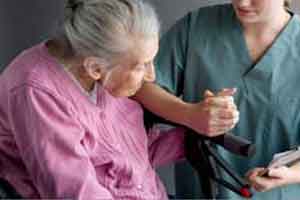- Home
- Editorial
- News
- Practice Guidelines
- Anesthesiology Guidelines
- Cancer Guidelines
- Cardiac Sciences Guidelines
- Critical Care Guidelines
- Dentistry Guidelines
- Dermatology Guidelines
- Diabetes and Endo Guidelines
- Diagnostics Guidelines
- ENT Guidelines
- Featured Practice Guidelines
- Gastroenterology Guidelines
- Geriatrics Guidelines
- Medicine Guidelines
- Nephrology Guidelines
- Neurosciences Guidelines
- Obs and Gynae Guidelines
- Ophthalmology Guidelines
- Orthopaedics Guidelines
- Paediatrics Guidelines
- Psychiatry Guidelines
- Pulmonology Guidelines
- Radiology Guidelines
- Surgery Guidelines
- Urology Guidelines
Older adults who are frail twice likely to experience delirium postoperatively

Dr. Jennifer Watt and fellow researchers at St. Michael's Hospital according to the systematic review have found that older adults who are frail are twice as likely to experience delirium post operatively, following elective surgery than others.The research findings have been published online in the Journal of General Internal Medicine.
Previous research by the authors found that frailty and cognitive impairment before surgery are associated with developing complications after surgery, but age is not.Other risk factors that are associated with developing postoperative delirium include smoking and the use of psychotropic medications, according to the authors.
"Chronological age from your birth date is not always an accurate assessment of how you've aged over your lifetime," said Dr. Jennifer Watt, a geriatric medicine fellow at St. Michael's and lead author of the review. "This study highlights how common delirium is among older adults undergoing elective surgery, and the importance of geriatric syndromes, including frailty, in identifying older adults who may be at risk."
The review examined 41 existing studies including more than 9,000 patients 60 years and older and reporting on postoperative delirium following elective surgery.
The researchers found that one in six older adults experience delirium following elective surgery. They also found that patients who had caregiver support are also 30 per cent less likely to experience delirium following elective surgery than those who did not.
Caregiver support was defined in the studies as the patient being married or having a higher number of visitors than average, according to the review. The studies included in the review did not specify whether caregiver support came before surgery, after surgery, or both, according to the authors.
"Previous research has shown that when families delivered a non-pharmacological intervention, such as helping to mobilize or orient the patient, the patient was less likely to experience delirium following hip surgery," said Dr. Watt. "What we're seeing in this review may be a result of the fact that they're doing some of these things for their loved ones already."
Patients who developed delirium following elective surgery are also at an increased risk of developing other adverse postsurgical outcomes, and are more likely to be discharged to another hospital, a long-term care facility, or die following surgery, according to the review.
Although older adults are assessed for cardiovascular and respiratory risk before an elective surgery, often not enough consideration is given to risk factors that are more common in older adults, including delirium, the authors said.
"Postoperative delirium is a common, yet preventable, complication experienced by older adults undergoing elective surgery," said Dr. Watt. "Understanding delirium risk factors may help clinicians, patients, and caregivers to target interventions aimed at lessening its burden."

Disclaimer: This site is primarily intended for healthcare professionals. Any content/information on this website does not replace the advice of medical and/or health professionals and should not be construed as medical/diagnostic advice/endorsement or prescription. Use of this site is subject to our terms of use, privacy policy, advertisement policy. © 2020 Minerva Medical Treatment Pvt Ltd